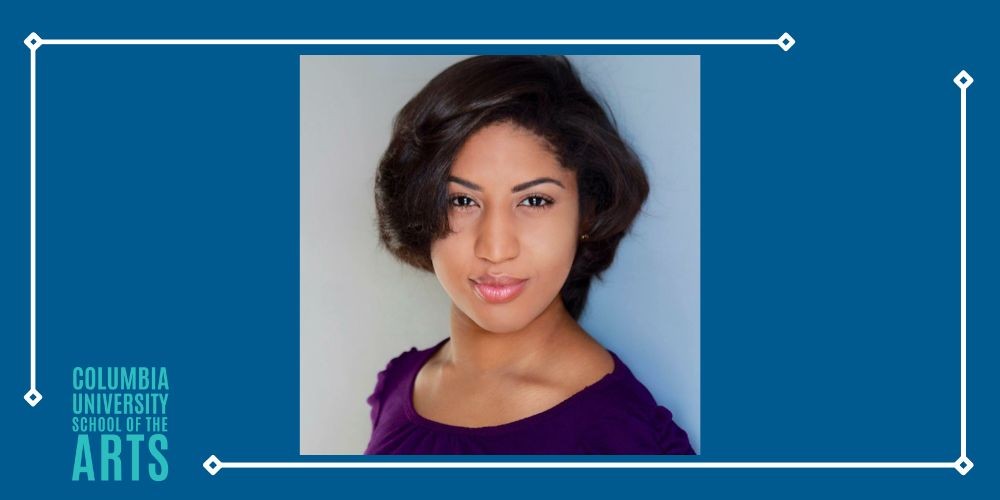Acting Thesis Interview: Katherine George
For the first of two thesis productions featuring Columbia MFA actors presented at Lenfest this fall, the company of Halfway Bitches Go Straight to Heaven shows the effects of displacement on a group of women seeking refuge at a shelter. We sat down with cast member and Acting student Katherine George to discuss her acting process and the upcoming production.
You’re playing Sarge in this play. Is there anything about that character that resonates with you?
Sarge is from the Bronx, and I’m also from the Bronx. I grew up in New York after moving from the Dominican Republic as a baby. In exploring her character and building a backstory, there’s a lot of things that connect the both of us. It wasn’t hard to imagine what it was like for a young Sarge growing up with a big family in the Bronx during the 90s and early 2000s. The play doesn’t necessarily go in depth about what it was like for Sarge growing up, but this New York City connection is very specific. When you meet a fellow New Yorker, it’s unlike anything else.
Was there additional research that you did for this character and the play in general? What was your process in preparing?
Yeah, so Sarge was a member of the army, she was a military woman. I did an extensive amount of research around war, around PTSD. (Unfortunately she suffers from PTSD and is also Bipolar.) So I did a lot of research around the mental health effects that veterans often deal with when returning home. I also did a lot of research around halfway homes and specifically the housing crisis for veterans. Substance abuse is something else I researched a lot—it’s a very important theme in the play.
Was there anything that surprised you from that research or anything from that research that you wanted to incorporate into your character?
I was surprised how much in the background veterans are. I spoke with people who spent time in the army, and they said, when they got home, there was nothing waiting for them—they weren’t celebrated. There were so many things that they expected because it was a dream that was sold to them. “You can get your degree, you can have these benefits.” But Sarge leaves the army and re-acclimating to civilian life—like many military people realize—is easier said than done. And there are so many people who, depending on what their form of discharge was, don’t have access to all of the things that are promised to them. And that to me, was really heartbreaking.
The play has a famously large cast. What was it like working with that many people on set?
It’s been my favorite experience at Columbia so far. We’re working with a genius director—[Adjunct Assistant Professor] Lisa Benevides-Nelson. She’s an absolute master at the craft, at breaking down the script, and she really got all of us together to understand how we all work in conjunction. The show doesn’t rely on one person, we all have to be actively listening, we all have to be actively participating. We all have to lend ourselves entirely to the experience, so that the audience will feel invited to do the same.
I’m working with a bunch of second years who I saw from the beginning of their journey. I love getting involved in and building community, so I was at auditions, and I met a lot of these people before they even got into the school. And then to actually be in the room with them—there’s a lot of admiration and respect. There’s no hierarchy, like between 3rd years or 2nd years. We’re all artists, we’re all here pouring our whole hearts into this story. It’s really beautiful to think about how New York is a melting pot. And Lisa was really specific about folks playing themselves in these roles. She asked us to stretch our imaginations in such a way that would explain why a person that presents this way in real-life, how they would end up speaking and moving through this world as these characters. We dig into their humanity, and it leaves audience members maybe wondering how many people they’ve judged in the past based on appearances.
And just speaking on the audience's expectations, what are you hoping that audiences get out of this production?
I saw the production in 2019, and I spent weeks unable to shake this story. And I told this to Lisa, my hope is that folks will leave this production unable to look at an unhoused person in the same way. Because that’s what the 2019 production did to me. I was looking at people who were asking for resources on the street, and I immediately thought, what is their story? Who are they as people? Because, it’s New York, you witness it all the time. But this play makes you do a double take. It doesn’t allow you to sit back. You kind of question how did this person end up here? How did we, as a society, fail this person?
What kind of acting or production would you like to be doing in the next five years?
I’m a singer as well as an actor. I love musicals, I love period pieces, and I love Latinidad and telling stories that we haven’t heard before. I’m interested in the 1930s Dominican Republic, I’m interested in Cuba in the 1950s. I get to time travel in a way, by doing period pieces. I also love TV and film, so give me a well-written dramedy, where I can have fun with people on set, and my heart would be full.
